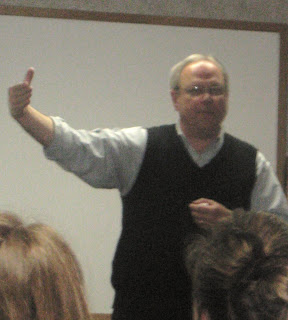
This is a view from the interstate of those Rocky Mountains. So different from our Appalachian Mountains, but still beautiful.
Last week we attended a training in Missoula, Montana on Linking Discovery and Job Development. It was held by Griffin-Hammis Associates in collaboration with the Rural Institute at the University of Montana. There are some links to Griffin-Hammis web site on the side and the Rural Institute. The different seminars focused on aspects of customized employment, discovery and job development. These ideas and practices that we have discussed and will continue to talk about in this blog. We wanted to venture out West to learn from colleagues, see how everyone else is doing things. What works in Seattle may work in WV and vice versa.
As with all seminars, each day had a theme, different educational pieces and activities/exercises to go along with them. The one I found the most interesting was during Day Two for the Information Interviews. We were given a list of businesses in a packet that had been contacted by Cary Griffin, who just knew some folks were going to come and chat with them. They didn't know how many or who, and were only given a loose idea of about what. We gave them our top 3 picks, we were sorted and away we went.
 Cary Griffin explaining the concept of Information Interviews to us.
Cary Griffin explaining the concept of Information Interviews to us.At an informational interview, it's not about getting a job at this point. (Of course, if the opportunity arises, don't ignore it.) It's about learning about that businessman and the business: how she got into this field, what he likes about it, is it a family-owned business, is your business a fixture in the community, what exactly do you do here (which is the question I had for Ross Johnson from Powder Coating of Montana--I had no idea what powder coating was!), etc...etc...
However, it's not like you have the owner on the hot seat, throwing question after question at them. Let the conversation grow organically and most of the questions you have, will be answered. This is called "smooth listening" Cary told us. Throw in an occasion question or idea when the conversation feels like it's going to stall, but don't be afraid of silence. Most of the time, silence makes people nervous & they'll start talking again. Also, take notes and don't interrupt and the most important thing I learned from the activity: don't dominate the conversation with items about yourself.
It's a pretty simple trap to fall into. You and the owner find that you have many things in common. You're very comfortable with each other and talking a lot. However, if you're sharing as much or more than the business owner, then what are you really learning? Sure, sharing a few anecdotal things about yourself during a conversation is normal, but the important thing for the Career Counselor/Job Developer to remember is that the information is supposed to be about the employer and the business.
There was quite a range of businesses a bicycle tour company, a television station and a market just to name a few. My group (pictured below) went to Powder Coating of Montana and spoke with one of the owners, Ross Johnson.
Above: The Power Coating Team: Joanne Savoie, director of adult day and vocational rehab services of J. Arthur Trudeau Memorial Center; Janet Steveley of Griffin-Hammis Associates; Ross Johnson, an owner of Powder Coating of Montana; Doug Bever, Outreach Coordinator of The Full Ahead Foundation of HOPE.
Not shown: Janis Longton, Self-Employment Coordinator & Employee Consultant for Career Concepts, Brian Connaughton and Tamara Woods Career Counselors at JSI.
When we visited Ross at his shop, a wealth of information was learned about how he got into this whole powder coating business. In the 70s his father worked for Champion at a paper mill and an employee died from a freak accident on site. As with any accident of that magnitude a job site OSHA was involved. Champion was told they needed to design a man-basket. Ross's father was given the task and he was able to patent it. Through the Lifting Technologies Inc. was created and from there Powder Coating of Montana in the 80s. He discussed how LTI has the cornerstone on the market and both companies are fixtures in Montanta. A large chunk of Powder Coating of Montana's business comes from LTI. His employees are trained on the job and turnover is very low. He showed us examples of his work, gave anecdotal stories and was a really engaging person to talk to.
After the exercise, we went to back to our conference room and shared our stories with each other. The thing I found the most interesting is not one story was really alike. All of these businesses were unique, the owners with varying personality traits and each group had a different way of talking to the proprietors. Therefore there's no one real approach to take to talking to them. I think there is sometimes a disconnect with people in the social service industry having to talk to business people: a sense of being out of your comfort zone. It's good to keep in mind that everyone has a story, whether it's the man, who vocational rehab has referred to you or the lady, who runs the general store down the street. Part of the job is just listening.






